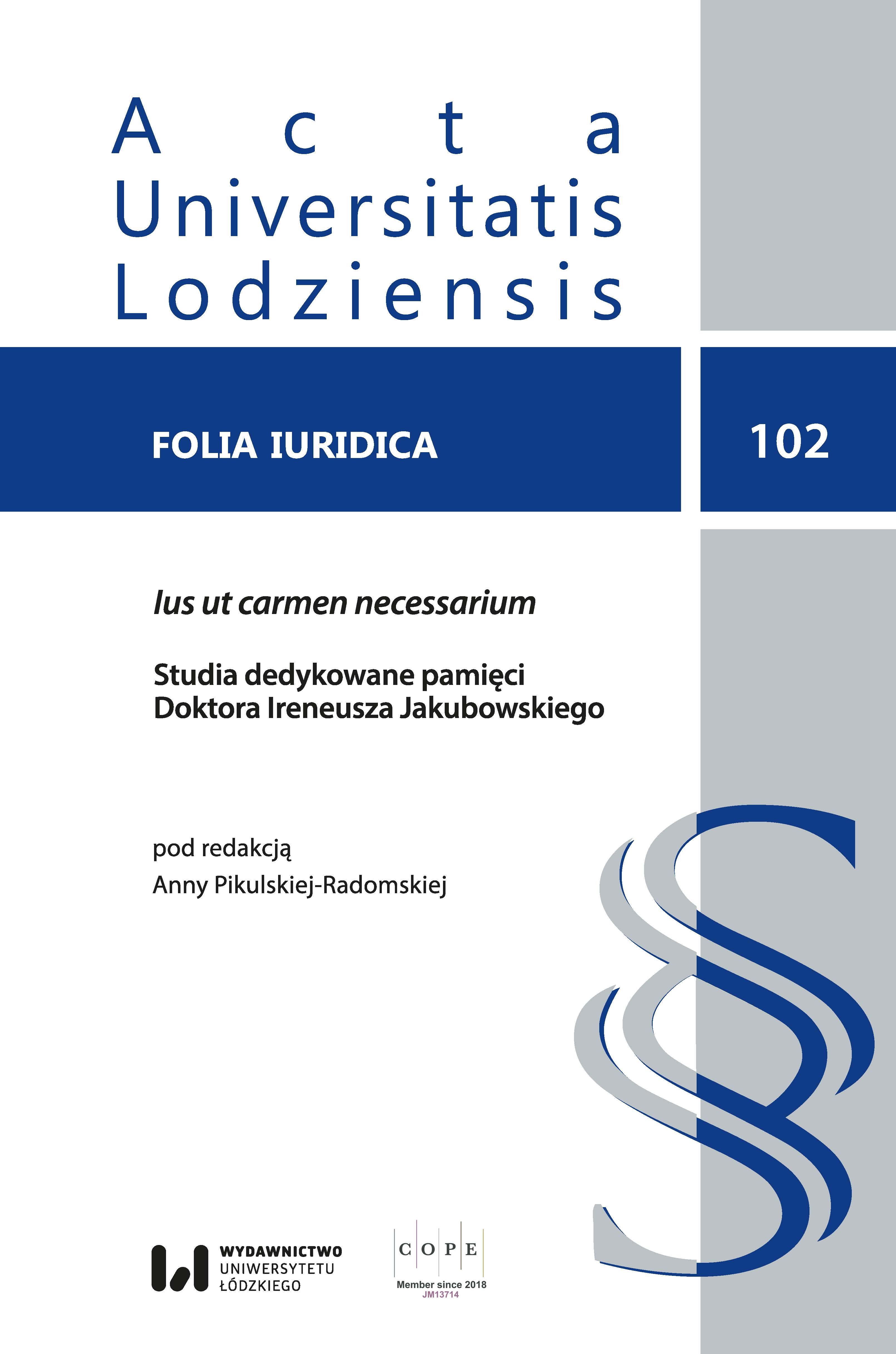Cantus vivit lege Romana!
DOI:
https://doi.org/10.18778/0208-6069.102.07Słowa kluczowe:
prawo rzymskie, muzyka menzuralna, romanesimo, ius commune, recepcja prawa rzymskiegoAbstrakt
W XIV-wiecznym traktacie Ars cantus mensurabilis mensurata per modos iuris zasady muzyki menzuralnej tłumaczone są przez odniesienia do ius commune. Celem artykułu jest prześledzenie rzymskich korzeni tych nawiązań i wykazanie, że i muzyka żyje czasem prawem rzymskim.
Pobrania
Bibliografia
Apel, Willi. 1961. The Notation of Polyphonic Music, 900–1600. Cambridge, MA: The Mediaeval Academy of America.
Google Scholar
Arban, Erika. 2017. „Seeing Law in Terms of Music. A Short Essay on Affinities between Music and Law”. Les Cahiers de Droit 58(1–2): 67–86. https://doi.org/10.7202/1039832ar
Google Scholar
DOI: https://doi.org/10.7202/1039832ar
Augustyn św. 1953. „O porządku”. W Dialogi Filozoficzne. Tom. 1. Tłum. Józef Modrzejewski. 146–226. Warszawa: PAX.
Google Scholar
Balensuela, Matthew. 1994a. Ars Cantus Mensurabilis Mensurata Per Modos Iuris. A new critical text and translation on facing pages, with an introduction, annotations, and indices verborum and nominum et rerum. London: University of Nebraska Press.
Google Scholar
Balensuela, Matthew. 1994b. „The «Ars cantus mensurabilis mensurata per modos iuris»: An Example of the «ius commune» applied to Medieval Music Theory”. Rivista internazionale di diritto commune 5: 169–185.
Google Scholar
Brundage, James A. 1976. „Prostitution in the Medieval Canon Law”. Signs 1(4): 825–845. https://doi.org/10.1086/493303
Google Scholar
DOI: https://doi.org/10.1086/493303
Brundage, James A. 1987. Law, Sex, and Christian Society in Medieval Europe. Chicago–London: The University of Chicago Press. https://doi.org/10.7208/chicago/9780226077895.001.0001
Google Scholar
DOI: https://doi.org/10.7208/chicago/9780226077895.001.0001
Daube, David. 1967. „The Marriage of Justinian and Theodora. Legal and Theological Reflections”. Catholic University Law Review 16(4): 380–400.
Google Scholar
Frank, Jerome N. 2018. „Niech zabrzmi jak muzyka”. W Frank. Red. Mateusz Stępień. Tłum. Mateusz Stępień. 17–76. Sopot: Wydawnictwo Arche.
Google Scholar
Jakubowski, Ireneusz. 2019. „Czy o prawie rzymskim można śpiewać?” W Ius est ars Boni et Aequi. Sztuka w prawie, prawo w sztuce. Red. Antoni Dębiński, Maciej Jońca, Izabela Leraczyk. 93–101. Lublin: Wydawnictwo KUL.
Google Scholar
Kamiński, Piotr. 2014. „Popolo di Pekino, la legge è questa…” W O operze i o prawie. Red. Ewa Łętowska, Krzysztof Pawłowski. 9–15. Warszawa: Oficyna Wolters Kluwer.
Google Scholar
Kantorowicz, Ernst. 2016. The King’s Two Bodies: A Study in Medieval Political Theology. Princeton: Princeton University Press. https://doi.org/10.1515/9781400880782
Google Scholar
DOI: https://doi.org/10.1515/9781400880782
Kołodko, Piotr. 2012. Ustawodawstwo rzymskie w sprawach karnych. Od ustawy XII Tablic do dyktatury Sulli. Białystok: Temida 2.
Google Scholar
Liebs, Detlef. 2007. Lateinische Rechtsregeln und Rechtssprichwörter. München: C.H. Beck.
Google Scholar
Łętowska, Ewa. 2005. „Communicare et humanum, et necesse est. O komunikacyjnej misji muzyków i prawników”. Monitor Prawniczy 1: 3–7.
Google Scholar
Manderson, Desmond. 2000. Songs Without Music: Aesthetic Dimensions of Law and Justice. Berkeley–Los Angeles–London: University of California Press.
Google Scholar
Manderson, Desmond. David S. Caudill. 1999. „Modes of Law: Music and Legal Theory – An Interdisciplinary Workshop Introduction”. Cardozo L. Rev. 20: 1325–1329.
Google Scholar
Misztal-Konecka, Joanna. 2011. Bigamia w prawie rzymskim. Lublin: Wydawnictwo KUL.
Google Scholar
Nitrato Izzo, Valerio. 2010. „Playing the Law: on Musical Performance and Legal Interpretation”. W Law, Liberty, Morality and Rights. Red. Tomasz Gizbert-Studnicki, Mateusz Klinowski. 38–46. Warszawa: Wolters Kluwer.
Google Scholar
Otis, Leah Lydia. 1985. Prostitution in Medieval Society: The History of an Urban Institution in Languedoc. Chicago: The University of Chicago Press. https://doi.org/10.7208/chicago/9780226640341.001.0001
Google Scholar
DOI: https://doi.org/10.7208/chicago/9780226640341.001.0001
Sokala, Andrzej. 1998. Meretrix i jej pozycja w prawie rzymskim. Toruń: Wydawnictwo Uniwersytetu Mikołaja Kopernika.
Google Scholar
Sondel, Janusz. 1997. Słownik łacińsko-polski dla prawników i historyków. Kraków: Universitas.
Google Scholar
Thomas III, George C. 1998. Double Jeopardy: The History, the Law. New York–London: New York University Press.
Google Scholar
Vivarelli, Carla. 2005. „Ars cantus mensurabilis mensurata per modos iuris” un trattato napoletano di ars subtilior? W Dolci e nuove note. Red. Francesco Zimei. 103–142. Lucca: Libreria Musicale Italiana.
Google Scholar
Zabłocka, Maria. 1987. „Zmiany w ustawach małżeńskich Augusta za panowania dynastii julijsko-klaudyjskiej”. Prawo Kanoniczne 30(1–2): 151–178. https://doi.org/10.21697/pk.1987.30.1-2.10
Google Scholar
DOI: https://doi.org/10.21697/pk.1987.30.1-2.10
Zajadło, Jerzy. 2016. „Estetyka – zapomniany piąty człon filozofii prawa”. Ruch Prawniczy, Ekonomiczny i Socjologiczny 78(4): 17–30. https://doi.org/10.14746/rpeis.2016.78.4.2
Google Scholar
DOI: https://doi.org/10.14746/rpeis.2016.78.4.2
Zajadło, Jerzy. 2018. „Słowo od Redaktora serii”. W Frank. Red. Mateusz Stępień. 7–8. Sopot: Wydawnictwo Arche.
Google Scholar
DOI: https://doi.org/10.18778/1505-9057.50.01
Zeidler, Kamil. 2018. Estetyka prawa. Gdańsk: Wydawnictwo Uniwersytetu Gdańskiego. Warszawa: Wolters Kluwer.
Google Scholar
Opublikowane
Jak cytować
Numer
Dział
Licencja

Utwór dostępny jest na licencji Creative Commons Uznanie autorstwa – Użycie niekomercyjne – Bez utworów zależnych 4.0 Międzynarodowe.














